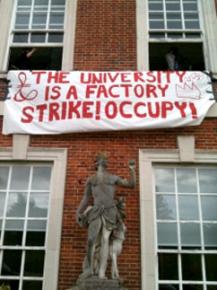British students resist department closure
reports on a student struggle at a prestigious London university.
THE LAST of Karl Marx's 1845 "Theses on Feuerbach" reads, "The philosophers have only interpreted the world, in various ways; the point is to change it."
Marx would not be surprised to learn that, 165 years later, a group of philosophy professors and students at North London's Middlesex University are discovering, in the words of one recent analysis, that in order to continue interpreting the world, they're going to have to change it.
After administrators, citing financial reasons, announced plans at the end of April to close Middlesex's philosophy department, students and faculty initiated a grassroots campaign to save it.
The world-renowned department, known as the Centre for Research in Modern European Philosophy, is home to 50 full- and part-time graduate students and employs 10 research professors. If the closure goes through, current students will be able to finish their degree programs, but professors would lose their jobs at a time when teaching and research positions are scarce. No new students would be accepted into the program.

The decision was never put before the university community for discussion or debate. Now, students and professors are fighting to save the department.
After Dean of Humanities Ed Esche stood up a scheduled meeting to discuss the rationale for the closure, 50 students staged a sit-in at his office. When Esche and the university administration refused to hear their demands, the students transformed the sit-in into an occupation of the entire administrative building, where they created what they called a "transversal space" for lectures, discussions, film screenings, and meetings on various topics in philosophy culture, and radical politics.
The occupation continued for 12 days before a court ordered the students to leave the building. While forced to comply with the order, students and staff staged a post-occupation rally at which Tariq Ali spoke in defense of the Centre. On May 20, students began another occupation, this time of the campus' library, where they remain as this article was being written.
While the first occupation was underway, more than 14,000 people added their names to an online petition protesting the closure, and a number of well-known academics, including radicals Slavoj Žižek and Noam Chomsky, signed a letter condemning the university's decision.
Though the first occupation was broken and the administration has not reversed its decision, the response to the closure signals a step forward for activists fighting attacks on higher education in the UK.
Outrage over the announcement of the closure was amplified by the Centre's well-established record of excellence. A 2008 evaluation conducted by the UK's Research Assessment Exercise (RAE) ranked Middlesex's philosophy department 13th among the 41 programs evaluated. The report also concluded that 65 percent of the research conducted by the Middlesex department qualifies as "world-leading" or "internationally renowned."
Citing the university's financial statement, John Protevi reported in the Times Higher Education Supplement that the department produces an annual revenue of more than $250,000--this in spite of the administration's claims that the department makes "no measureable contribution" to the university.
What's more, Protevi discovered, due to the rules governing the way the RAE distributes funding, the university will continue to receive this sum until the end of the current funding cycle in 2015 or 2016-- even though the department will no longer exist.
WHILE ADMINISTRATORS claim the Centre is being closed for purely financial reasons, some academics and activists are speculating that the move is politically or ideologically motivated.
The Centre is closely associated with the socialist and feminist journal Radical Philosophy, and the department is known for the study of philosophy in the Continental tradition, where the ideas of Marx and other French and German anti-capitalist, feminist, anti-racist and anti-homophobic thinkers are hugely influential. This tradition of research is sometimes contrasted with another, sometimes called the "analytic" or "Anglophone" tradition, which predominates in the U.S. and Britain--Middlesex's focus on Continental philosophy may make it a black sheep among other departments in the UK.
What role this and other political questions played a role in the decision to close the Centre is unclear, but these considerations contribute to the sense among many Middlesex students that their program is being unjustly singled out for closure simply because it is different.
The attack on Middlesex's philosophy program fits in to a developing pattern of neoliberal assault on the humanities at higher educational institutions in the UK. Earlier this year, administrators at King's College London attempted to close its philosophy department, but were forced to reverse the decision in the face of an international petition and letter-writing campaign comparable to the one sparked by the pending closure at Middlesex.
According to the perverse logic of university administrators, humanities programs produce less revenue per unit of capital invested than pre-professional programs, so capital should be reallocated to programs that can bring more profit to the university. This runs contrary to the mission of publicly funded universities--especially those like Middlesex with reputations for intellectual openness and rigorous inquiry in all disciplines.
Other universities in Britain have announced across-the-board cuts in spending, and have in some cases case been met with resistance.
Though the Middlesex campaign has not yet succeeded in saving the department, one positive sign has been the activist role played by students, who initiated the campaign to fight the closure.
While petitions and letters from academic celebrities can surely play an important role in struggles against closures and cuts, there is no substitute for grassroots resistance on the part of student activists. This has been shown by the recent victory of the Graduate Employees Organization at the University of Illinois-Chicago and the success of the ongoing student strike Puerto Rico.
Activists interested in defending higher education the world over would do well to study these events to learn lessons that will enhance their own political practice.


